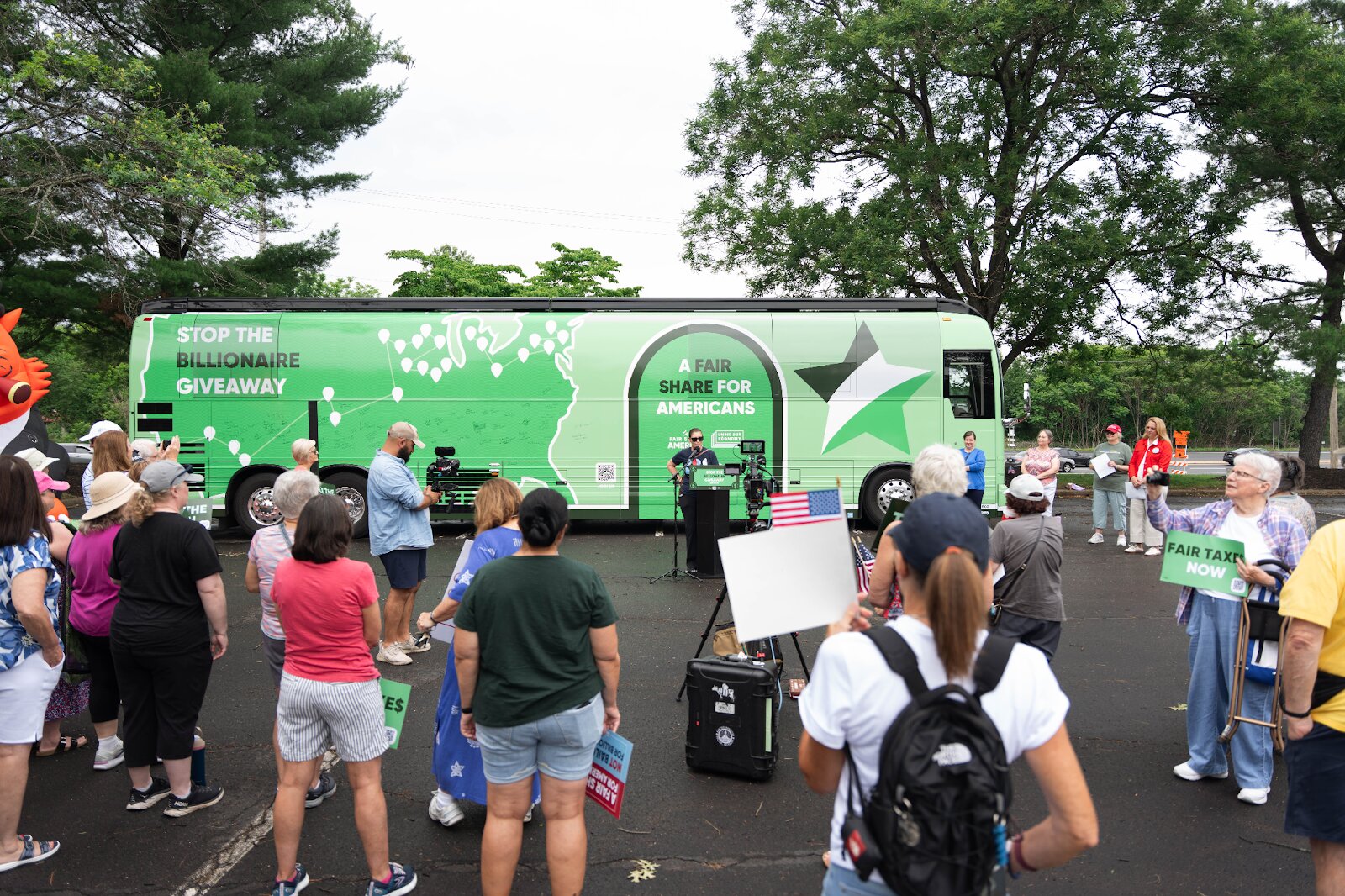A big green bus hit the brakes in Bucks County to talk about Medicaid, SNAP, and tax cuts.
Fair Share America’s “Stop the Billionaire Giveaway” national bus tour stopped at Rep. Brian Fitzpatrick’s office on Sunday afternoon to speak about the GOP budget bill’s proposed Medicaid and SNAP cuts in order to help fund tax cuts for the wealthy. Joining the the event were local representatives from Yardley Indivisible, Pennsylvania Policy Center, mental health partners, and County Commissioner Bob Harvie.
The House of Representatives passed the federal budget bill on May 22 in a one vote margin, which Republican Rep. Fitzpatrick’s vote helped pass. On June 16, the Senate Finance Committee released their budget reconciliation text which kept provisions that would cut Medicaid spending by $800 billion, and even added more provisions on work requirements and lowering health care provider taxes.
Harvie, who is also a 2026 candidate for Fitzpatrick’s congressional seat, spoke about the budget process on a more local level. According to Harvie, about half of the budget every year is for social services, which helps protect children from abuse, helps medical care get to senior citizens, helps veterans, and takes care of those residents who have intellectual physical disabilities. Yet to fund these programs, “tens of millions of dollars” come from the federal government.
“All of them are at risk because if the funding from the federal government doesn’t come directly to us, it gets cut as it goes to the state and then comes to us, we do not have the money to carry out the programs to the level they’re supposed to be, and we all know the level should be higher.”
Harvie added that since 2020, county officials have expanded services for mental health care, expanded the number of social workers helping children, and expanded programs for seniors and veterans, all while balancing the county’s budget.
“Don’t let anybody tell you in Washington, D.C. that we can’t do all those things to balance the budget,” Harvie said, who pointed to the county commissioners’ record of bipartisanship during his tenure.
In an interview with the Beacon, Harvie discussed what would happen if the current draft of the federal budget bill were to be passed, even if the 2026 midterm elections saw a blue wave.
“It’s not like you can’t undo this and put money back in the system at some point, but what damage have you done to children, people with disabilities, the elderly, over the span of those couple of years while you’re waiting for a more level-headed House of Representatives to take over?” Harvie asked. “Once the damage is done, there’s going to be real pain for people.”
In a press release after he voted to pass the budget bill, Rep. Fitzpatrick stated he would be “working closely with the Senate” to “strengthen SNAP and Medicaid solvency for the long-term.” Yet on June 16, the Senate Finance Committee released their budget reconciliation text which kept provisions that would cut Medicaid spending by $800 billion, and even added more provisions on work requirements and lowering health care provider taxes.
Marc Stier, executive director of the Pennsylvania Policy Center, capitalized on this.
“The next time Representative Fitzpatrick tells you [he] voted for it because [he] knew it was going to get better in the Senate, that’s wrong. It’s getting worse in the Senate.”
The budget bill likewise has devastating repercussions for SNAP recipients. Over 400,000 Pennsylvanians would lose SNAP benefits.
Yet Stier pointed out that the numbers of residents who would lose Medicaid and SNAP benefits is “misleadingly low” because they only count the share of people who are currently using the programs. Stier emphasized that the programs function as a safety net for people, helping those who can’t work because they are ill or have an elderly relative to take care of, have lost their jobs perhaps due to the pandemic, or need temporary help because of positive situations.
“If this bill passes, it’s not just some share of the people who are getting this program now who will be hurt. It’s two or three times that number who over 10 years will need the social safety net, will need Medicaid and SNAP, and it will not be there for them when they need it,” Stier said.
Stier estimates that the tax reform in the bill will give the top 1% of income earners in Pennsylvania $55,000 worth of tax cuts, the top 0.1% about $250,000 in tax cuts, and the bottom 20% about $80 in tax cuts per year.
“No democratic government will get away with taking so much from the many and giving it to the few as long as the people know what’s in it,” Stier said.
The bill may cause hospitals and grocery stores to close at higher rates and face staffing shortages. Grocery stores are already a low-margin business, and Stier added that SNAP pays for about eight percent of grocery purchases in Pennsylvania, especially in Southern Bucks County towns such as Bensalem.
In a broader overview, the commonwealth could face losing more than 467,000 jobs and $63 billion in economic activity over ten years, according to the Hospital and Healthsystem Association of Pennsylvania.
Stier expressed the precarious situation the budget bill puts Rep. Fitzpatrick in an interview with the Beacon.
“We don’t do electoral politics, but I can give electoral advice to Representative Fitzpatrick,” Stier said. “He doesn’t win [elections] by that much. I don’t understand how he thinks he can hurt so many people in this district with his vote and survive the next election.”
Alexander Anderson, a participant in Bucks County Peer Net, spoke about his experience in this mental health support service which he receives through Medicaid and Medicare funding. Anderson said he has had mental health challenges since he was a teenager, including depression, anxiety, and PTSD. But for him, the Peer Net was a “turning point.”
“Through the help of some great peer specialists, I was able to graduate from college, and I found my voice and confidence,” Anderson said. “Everyone deserves to know they have a chance to find hope. That hope, to me, was through Medicaid and mental health partnerships.”
Debbie Duarte, speaking on behalf of Yardley Indivisible, recalled her economically disadvantaged childhood when her mother did not have a job and her father mostly worked at Bethlehem Steel. Duarte said when the mill would shut down for months at a time when production slowed down, her father would receive government surplus, which later became food stamps and then SNAP.
“This program was a lifesaver for us. Instead of eating mustard sandwiches and dandelion salad, we now had cheese, peanut butter, pasta, oatmeal, and rice,” Duarte said.
With the food assistance money stretching farther, Duarte’s family was able to afford coal to heat the house and gas to drive to doctor’s appointments. As Duarte’s father continued to work at the mill, they no longer needed government assistance.
“But knowing it was there, if we needed it if the time rose again, was very comforting,” Duarte said. “That’s what SNAP is. It’s assistance when needed–a lifeline, or a safety net for all of us.”
A recent Fox News poll, conducted between June 13-June 16, showed that the budget bill is unpopular amongst the public, with 59 percent opposed to it. Kristen Crowell, executive director of Fair Share America, said the bill is the “most unpopular piece of legislation in the history of this country,” and Rep. Fitzpatrick should be aware of this.
“Today we are going to make sure that Representative Fitzpatrick cannot sit in his office and say that he did not hear from us,” Crowell said. “We are making sure that as he flies to Washington to cut deals in the dark, there is no room to say, we didn’t know our constituents hated this bill.”







